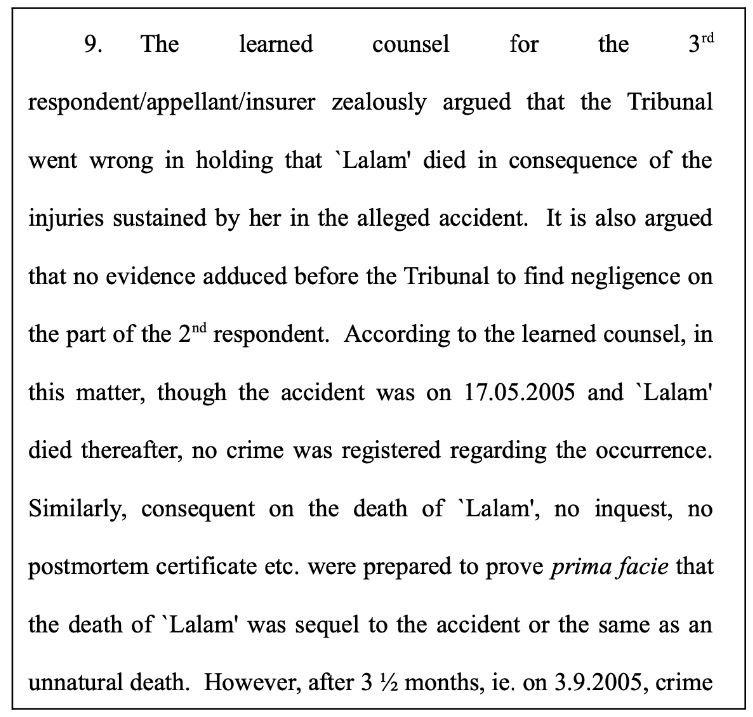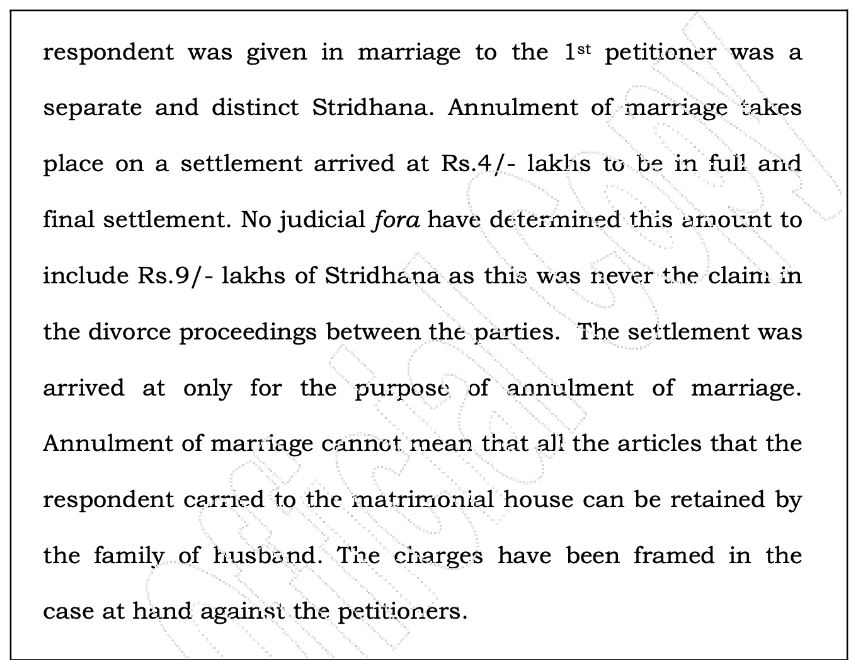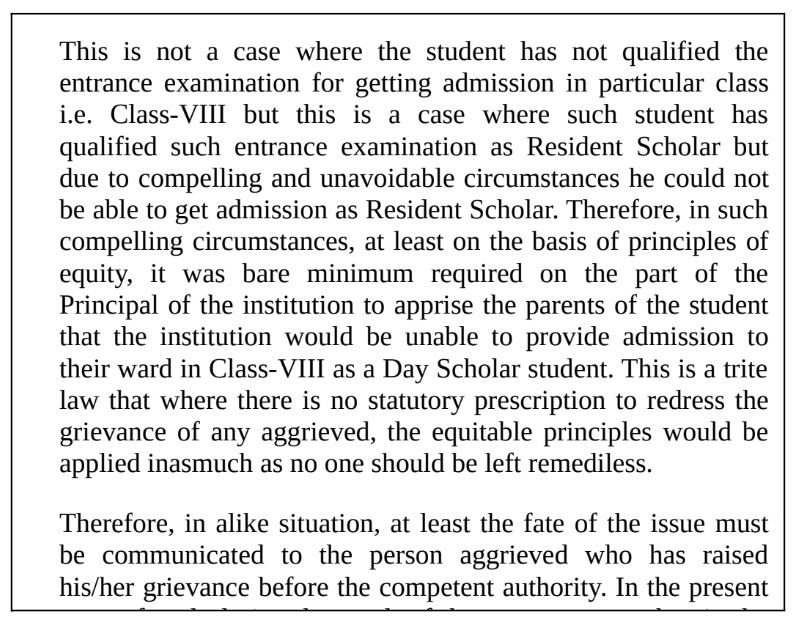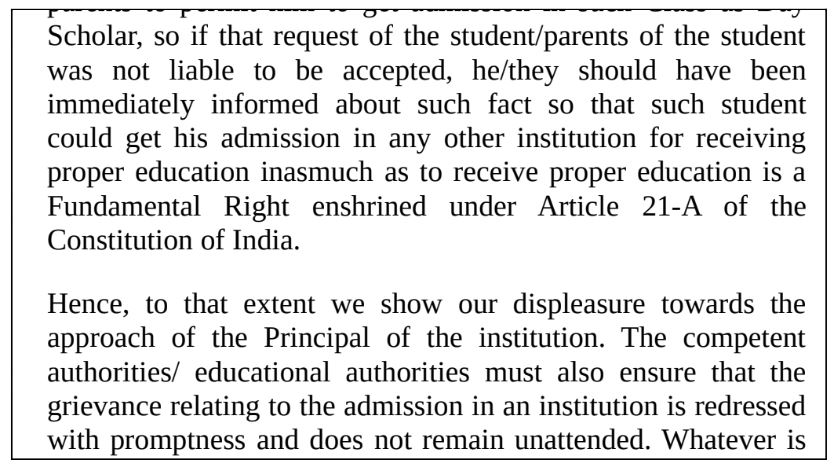In this week’s review of Court Judgments, we look at Kerala High Court’s observation regarding the need to fulfill conditions to claim compensation in case of an accident, Karnataka High court’s judgment relating to Stridhan, Allahabad High court’s observation regarding the Right to proper education and Rajasthan high court’s order to provide maintenance to a wife who suffered from the cruelty of husband.
Kerala HC: Lays down ‘Twin Conditions’ to claim compensation in plea alleging driver’s negligence
A single-judge bench of Kerala High Court constituting, Justice A. Badharudeen has held that a claim under Section 166 of the Motor Vehicles Act needs to fulfill twin conditions i.e. the petitioners must not only prove the negligence on part of the driver or rider but also prove that the person alleged to have sustained injuries died as a consequence of those injuries.
The judge stated that it is the burden of the petitioners to provide evidence to satisfy the allegations raised by them. In the case, Oriental Insurance Co. Ltd vs. V.Babu & Ors, a woman allegedly met with an accident and succumbed to the injuries while traveling on a motorcycle driven by her brother.
Her husband and her two sons filed an application under Section 166 of the Motor Vehicles Act before the tribunal alleging that the accident was a result of the brother’s negligence. They claimed compensation from the owner, driver and insurer of the motorcycle.
The appellant in this case i.e., the insurer denied the accident and the negligence attributed against the driver i.e., the brother who is also deceased. The insurer further pointed out that the police had not registered a case until 3 months later, which was based on the private complaint lodged by the husband before the Magistrate.
The argument was that the deceased died of natural causes and that there was no post-mortem certificate or inquest.

The Tribunal found negligence against the driver based on the statements of the husband and the doctor who treated the deceased and granted compensation to the applicants. This was challenged in the High court by the insurer.
In the High court, the argument put forth by the appellant was that it was wrong to hold that the deceased died due to the injuries sustained in the accidence and further added that there was no proof of negligence on the driver’s part.
It was also pointed out that the final report on the crime indicates that the investigating officer found that the entire allegations were false. It was also argued that the husband’s evidence cannot be relied upon as he is not a witness to the occurrence.
The respondents to the case argued that although there was no case filed immediately after the accident, the death was due to the injuries of the accident as per the wound certificate.
The court noted that the respondents have failed to prove the negligence on part of the driver. Although the FIR states that the rash & reckless driving of the brother caused the accident, according to the Final report, these allegations were false.
The Judge highlighted that in the claim under Section 166 of the Motor Vehicle Act, proof of negligence is mandatory. In case of death, there should also be proof to hold that the death was due to the injuries caused by the accident.

Although the wound certificate refers to the injuries due to the accident, there is no autopsy report which concludes that the death was due to the injuries.
The court held that no proof would substantiate the two conditions and proceeded to set aside the award of the tribunal.
Karnataka HC: Stridhan cannot be retained by the family of the husband on annulment of marriage
In the case of Ganesh Prasad Hegde & Others vs. Surekha Shetty, the Karnataka High Court stated that in the case of annulment of marriage, the family of the husband cannot retain the articles carried by the woman to the matrimonial house i.e. Stridhan.
In the case presided by a single-judge bench of Justice M Nagaprasanna, the petitioner and his parents questioned the order dated 31 March 2015, in which Additional Chief Metropolitan Magistrate of Bangalore dismissed the application of the petitioners seeking discharge from the proceedings initiated by his ex-wife, for offences punishable under Section 406 of the IPC.
The petitioner contended that there is nothing left to be paid to the respondent i.e., the estranged wife, as it was agreed upon for divorce that permanent alimony was to be paid in full and final settlement towards annulment of marriage.
The High Court of Bombay in a Family Court Appeal had clearly indicated that the marriage between the two was dissolved and permanent alimony of Rs.4 lakhs was paid. The claim of maintenance was still left open and cannot be part of Section 406 of IPC i.e., relating to breach of trust.
However, the respondent submitted that the permanent alimony of Rs. 4 lakhs did not contain the amount which was paid prior to the marriage. And that the petitioners, cannot hold on to the Stridhan after divorce, which was given on two occasions – Rs. 4 lakhs and Rs. 5 lakhs.
She alleged that this amounts to a criminal breach of trust for not returning the money, despite a notice being issued. The court went through the relevant documents and the details of the case and noted that the annulment of the marriage did take place on the settlement of Rs. 4 lakhs. The court also noted that Rs. 9 lakhs were paid in 1998 as Stridhan when the respondent was given in marriage.
It stated that there was no mention of the Stridhan in the divorce proceedings and settlement, which was restricted to Rs.4 lakhs of alimony. However, it does not imply that all the articles that the respondent carried to the matrimonial house can be retained by the family of the husband.

The court proceeded to dismiss the petition.
Allahabad HC: Receiving proper education is a fundamental right under Article 21A of the Constitution of India
The Bench consisting of Justice Rajesh Singh Chauhan and Justice Subhash Vidyarthi of Allahabad High Court observed that receiving proper education is a fundamental right enshrined under Article 21A of the Constitution of India.
As per the case details, Tanishk Srivastava, an 8th class student appeared for the entrance test held on 20 March 2022, for admission as Resident Scholar in the La Martiniere College, Lucknow for taking admission into Class VIII.
The student was declared successful and eligible for admission as per the results declared on 25 March 2022. However, due to his mother’s illness and his father being out of the station, he could not get admitted as Resident Scholar.
His father moved an application before the school management to allow his son to be given admission as a day scholar instead as he is ready to complete all the required formalities including the fees.
Upon non-receipt of any confirmation regarding the admission until 18 April 2022, the father filed a writ petition before the court. This was dismissed by a single judge. This was challenged through an instant appeal with the Division Bench.
The division bench upheld the order given by the single judge, since the institution was an unaided minority private institution, and hence the writ petition against it may not be entertained by the court. It relied on an earlier case of 2016, Committee of Management, La Martiniere College, Lucknow, and Anr Vs. Vatsal Gupta and Others.
However, the court observed that the institution ought to have communicated the information of the status of the admission to the parents at the earliest so that appropriate action can be taken.

It added that this could have helped the student to get admission to any other institution, as receiving proper education is a fundamental right enshrined under Article 21A of the constitution of India. Although the petition was dismissed, the court observed that the grievances relating to the admission to an institution need to be redressed with promptness.

Rajasthan High Court: Leaving the matrimonial house on account of husband’s cruelty, not desertion.
In the case, Richa Dharu vs. Hemant Panwar, Rajasthan High Court observed that if a lady is staying away on account of her husband’s cruelty, it cannot be termed desertion. It added that the non-conducive circumstances created by the husband are bound to push away the wife.
The wife has filed a petition in the court stating that the respondent i.e., the husband is working as a Branch Manager in Bank of Baroda and is earning Rs.90 thousand per month. She further stated that the trial court has denied the monthly maintenance on the ground that the divorce was allowed between them. As per her, the divorce was the ex-parte claimed by the husband.
The petitioner’s counsel argued that the definition of “wife” includes a woman who has been divorced by or has obtained a divorce from her husband and has not remarried. Therefore, she is entitled to receive maintenance. The council also stated that it was voluntary desertion of both parties, and it was established that the marriage was derailed because of the cruelty of the husband. The petitioner has sought a monthly maintenance of Rs.30 thousand.
The High court observed that the family court has erred in denying maintenance to the wife. It is observed that a lady suffering from cruelty cannot be considered to have deserted her husband.

Justice Pushpendra Singh Bhati directed monthly maintenance of Rs. 10 thousand to be paid to the petitioner by the respondent-husband.


